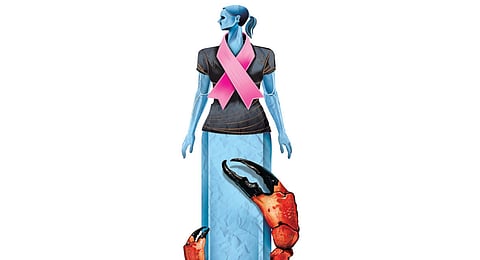

NEW DELHI: BREAST cancer has emerged as the world’s most common cancer, with the incidence rate predicted to be more than three million, causing a million deaths per year by 2040, according to the new Lancet Commission report. It said that more than three million women were diagnosed with breast cancer in 2020 and it caused 6,85,000 deaths globally.
In 2020, women around the world, on an average, had a 1 in 12 risk of being diagnosed with breast cancer before turning 75-years-old. Around one per cent of the total incidence occurs in men, researchers said.
The burden is predicted to increase to over three million new diagnoses per year by 2040, an increase of 40% from 2020, with low and middle-income countries (LMIC) being “disproportionately affected”.
By 2040, deaths due to the disease will be a million a year, an increase of 50% from 2020, it said. “This is neither acceptable nor inevitable as action now can prevent many of these future cancers,” the authors wrote. It also noted that breast cancer is “now the world’s most prevalent cancer”, saying that at the end of 2020, 7-8 million women with breast cancer were diagnosed in the five years, with an unknown number of people living with metastatic breast cancer.
Dr Pragya Shukla, Head of Department (Clinical Oncology), Delhi State Cancer Institute said that earlier in India, breast cancer was considered a disease of urban India that affected the rich and upper middle class. “But now it’s affecting all classes, both urban and rural communities.”
She said that one in twenty-eight women is likely to develop breast cancer during her lifetime and it is more – one in 22 - for urban women than the rural group - one in 60, she added.
However, she said breast cancer can be prevented. “Lifestyle modifications such as decreasing weight, increasing activity, and decreasing stress can lower the chances of getting breast cancer. Regular screening can help in early detection and thereby increase the probability of cure,” Dr Shukla said.
The report said that despite tremendous advances in breast cancer research and treatment over the past three decades - leading to a more than 40% reduction in breast cancer mortality in some high-income countries (HICs) - there remain inequities, with many groups being systematically left behind, ignored, and even forgotten, the report said.
The scale of suffering associated with breast cancer, along with other costs, is not well-measured, with society and policymakers only seeing the “tip of an iceberg and calling for “bold policy changes” that can reduce the population exposed to risk factors in their control such as alcohol consumption, overweight and physical activity.
They suggested better communication between patients and health professionals can improve quality of life. “Women’s fundamental human rights have historically been accorded less respect than men’s in all settings, with implications for patient agency and autonomy,” said Reshma Jagsi, Emory University School of Medicine, US.
‘Better lifestyle can prevent breast cancer’
Dr Pragya Shukla, Head of Department (Clinical Oncology), Delhi State Cancer Institute said that earlier in India, breast cancer was considered a disease of urban India that affected the rich and upper middle class. “But now it’s affecting all classes, both urban and rural communities.” However, she said breast cancer can be prevented. “Lifestyle modifications such as decreasing weight, increasing activity, and decreasing stress can lower the chances of getting breast cancer,” Dr Shukla said.